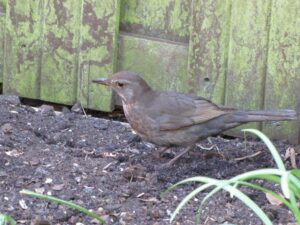Hundreds of reports of dead blackbirds
Hundreds of reports of dead blackbirds
Usutu-virus detected in 8 Dutch provinces
Joint message from the DWHC, Erasmus MC, Sovon, Vogeltrekstation NIOO-KNAW, Vogelbescherming
The DWHC (Dutch Wildlife Health Centre), Sovon Vogelonderzoek Nederland and Vogelbescherming Nederland have received thousands of mails and phone calls reporting sick, weak and dead blackbirds. At least 1800 dead blackbirds have been reported; this compares to the ten reported over a comparable period this time last year. Usutu virus has been detected in birds from eight provinces. Since the warm autumn is over the number of reports has dropped: It is thought that the colder weather means that the biting flies that transmit the disease are less active resulting in reduced spread and Usutu-virus mortality.
Hundreds of people contacted the DWHC (Dutch Wildlife Health Centre), Sovon Vogelonderzoek Nederland, Vogeltrekstation or Vogelbescherming Nederland last week to report a total of 1800 dead blackbirds. The cases investigated at the Erasmus Medical Centre showed that Usutu-virus has been causing deaths in the provinces of Noord-Brabant, Gelderland, Limburg, Utrecht and Overijssel, with single cases reported in Friesland, Noord-Holland and Zuid-Holland.
Impact of the virus
It is difficult to predict the impact that this will have on the number of blackbirds in the Netherlands: With more than a million breeding pairs the population is likely to be able to withstand a blow such as this. The actual number of dead birds is impossible to determine as sick birds tend to seek out quiet places, whereby the carcasses are not found. It remains unknown as to whether an outbreak of the virus next year could result in more deaths. An assessment of the impact of this outbreak on the current population will be possible when breeding pairs are counted in the springtime.
Public concern
Many people have contacted one of the four organisations involved in these investigations to express their concern about the birds in their immediate surroundings. One of the most frequently asked questions is whether Usutu virus is the reason for the small number of blackbird sightings: whilst it has played a role, another reason that we see fewer birds at the end of the summer is because this is the time when many birds moult and during this time they tend to remain out of sight.
With the arrival of autumn and the drop in temperatures the biting flies that transmit this virus are becoming less active and it is expected that we will see a gradual drop in the number of birds dying from Usutu-virus infection.
Very rarely people can become infected with the virus. Dead birds should only be picked up with disposable gloves or a plastic bag and either buried in the garden, discarded in the grey wheelie bin or taken to the local county cadaver disposal service.
Reporting
Dead blackbirds and other birds can be reported via the DWHC submission form (in English) or via the Sovon website. By reporting finding dead bird(s) you are helping us to visualize the spread of the virus.




